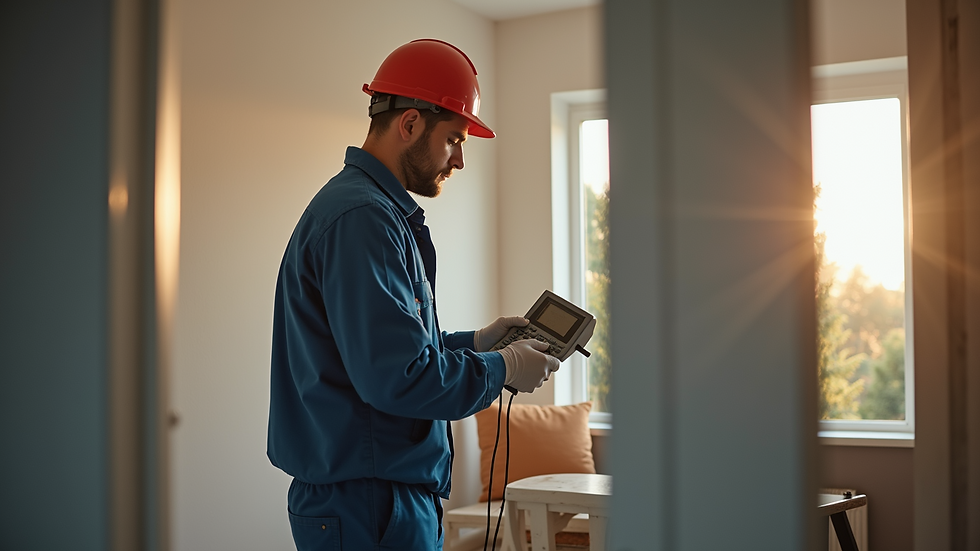Explore Reliable Radon Testing Services
- Frank Talarico
- Oct 27, 2025
- 4 min read
Radon is a naturally occurring radioactive gas that can seep into homes through cracks and openings in the foundation. It is colorless, odorless, and tasteless, making it impossible to detect without proper testing. Exposure to high levels of radon over time can pose serious health risks, including lung cancer. Whether you are buying, selling, or simply maintaining your home, understanding radon and the available testing options is crucial for safety and peace of mind.
Understanding Radon and Its Risks
Radon forms from the natural breakdown of uranium in soil, rock, and water. It can enter buildings through gaps in floors, walls, and foundations. Because it is invisible and odorless, many homeowners remain unaware of its presence until testing is done.
Long-term exposure to elevated radon levels is the second leading cause of lung cancer after smoking. The Environmental Protection Agency (EPA) recommends action if radon levels exceed 4 picocuries per liter (pCi/L) of air. Testing is the only way to know if your home has a radon problem.
Key facts about radon:
Radon levels can vary widely even between neighboring homes.
It can accumulate in basements, crawl spaces, and lower levels.
Radon can also contaminate well water, though this is less common.
Testing is affordable and straightforward.

Radon Testing Options: What You Need to Know
There are several radon testing options available, each with its own advantages depending on your needs and timeline. Choosing the right method ensures accurate results and helps you take timely action.
Short-Term Testing
Short-term tests typically last from 2 to 7 days. They are useful for quick screening, especially during real estate transactions or when you want immediate results.
Types: Charcoal canisters, electret ion chambers, and continuous radon monitors.
Pros: Fast results, easy to use, affordable.
Cons: May not reflect long-term radon levels due to fluctuations.
Long-Term Testing
Long-term tests measure radon levels for 90 days to one year. These provide a more accurate picture of average radon exposure over time.
Types: Alpha track detectors and electret ion chambers.
Pros: More reliable data, better for assessing health risks.
Cons: Takes longer to get results.
Professional Testing Services
Hiring certified professionals ensures precise testing and interpretation of results. Professionals use advanced equipment and follow strict protocols.
Benefits: Accurate measurements, expert advice, and mitigation recommendations.
Ideal for: Real estate transactions, homes with previous high radon levels, or complex structures.
For reliable and certified radon testing services, consider contacting experienced providers who specialize in residential radon and water contamination testing.

How Can You Check for Radon in Your House?
Testing your home for radon is simple and can be done in a few steps:
Choose a Testing Method: Decide between short-term or long-term testing based on your urgency and needs.
Purchase or Hire: Buy a test kit from a hardware store or online, or hire a certified radon tester.
Place the Test Kit: Follow instructions carefully. Place the kit in the lowest lived-in level of your home, away from drafts, high humidity, and direct sunlight.
Wait for the Testing Period: Keep windows and doors closed as much as possible during the test.
Send the Kit for Analysis: Mail the test kit to the lab specified in the instructions.
Review Results: If levels are above 4 pCi/L, consider retesting or taking mitigation steps.
Tips for accurate testing:
Avoid testing during extreme weather or high ventilation.
Test during the heating season for more consistent results.
Test every home, even if neighbors have low radon levels.
Why Radon Testing is Essential in Real Estate Transactions
Radon testing plays a critical role in real estate transactions. Buyers want assurance that the home is safe, and sellers want to avoid surprises that could delay or derail a sale.
For Buyers: Testing before purchase helps identify potential health risks and estimate mitigation costs.
For Sellers: Testing and addressing radon issues upfront can increase buyer confidence and property value.
For Agents: Knowledge of radon testing options and results supports transparent and smooth transactions.
Many states and localities require radon disclosure or testing during home sales. Even where not mandatory, testing is a wise precaution.
Taking Action After Radon Testing
If your test results show elevated radon levels, don’t panic. There are effective mitigation solutions to reduce radon concentrations and protect your family.
Common Radon Mitigation Techniques
Sub-slab Depressurization: A vent pipe system and fan draw radon from beneath the foundation and release it outside.
Sealing Cracks and Openings: Reduces radon entry points but is usually not sufficient alone.
Improving Ventilation: Increases air circulation to dilute radon levels.
Water Treatment: If radon is found in well water, treatment systems like aeration or granular activated carbon filters can remove it.
Hiring a Professional Mitigator
Radon mitigation requires expertise to design and install effective systems. Certified mitigators assess your home’s structure and radon levels to recommend the best approach.
Remember:
Mitigation systems typically cost between $800 and $2,500.
Properly installed systems can reduce radon levels by up to 99%.
Regular testing after mitigation ensures continued safety.
Staying Safe with Regular Radon Testing
Radon levels can change over time due to weather, home renovations, or changes in ventilation. Regular testing every 2-5 years is recommended to maintain a safe living environment.
Test after major renovations or foundation repairs.
Test if you move into a new home.
Use professional services for peace of mind.
By staying informed and proactive, you can protect your home and loved ones from the dangers of radon exposure.
Radon testing is a vital step in maintaining a healthy home environment. Whether you are buying, selling, or simply safeguarding your property, understanding your radon testing options and taking timely action can make all the difference. For trusted and accurate radon testing services, rely on certified experts who specialize in residential radon and water contamination testing. Your health and safety are worth it.



Comments